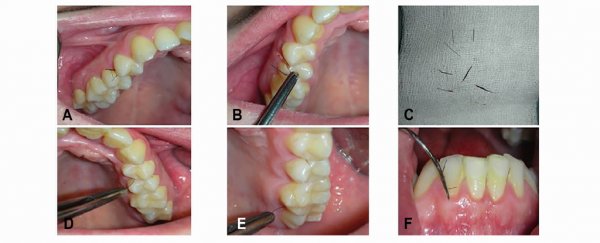From time to time, we all need to pull out the odd hair that's grown out of place. But we're willing to bet that one spot you've never needed to pluck is your gums.
Just over 10 years ago, a 19-year-old woman met with doctors at the University of Campania Luigi Vanvitelli in Italy, providing them with a rare case of what's known in the medical field as gingival hirsutism.
"In 2009, we reported a case of a young woman who presented with hairs on the sulcular epithelium of the retroincisor palatal papilla," the specialists reported in their case study, published in August 2019.
To translate, they found a scattering of eyelash-like hairs protruding from the soft tissues directly behind her upper front teeth.
A dig through the literature revealed just five other similar cases – all men – dating back to the 1960s.
It's impossible to know just how many have been afflicted with this condition throughout history. With so few recorded examples, doctors have a hard time even figuring out why this happens.
In this case, pathologists were quick find a potential clue. Hormone tests and ultrasounds led to a diagnosis of polycystic ovary syndrome (PCOS), a reproductive condition connected to hormonal imbalances.
'Hirsutism' – or excess hair – is a common consequence of this imbalance, but such atypical growth is usually restricted to parts of the body that already sprout follicles, such as the face, torso, and limbs.
In this case, the hairs were ectopic, meaning they were growing out of place. So while the PCOS might not have been a cause, it almost certainly exacerbated the situation.
The hairs were removed surgically, and following a course of oral contraceptives to help address the imbalance of hormones, the patient returned to a mouth-hair-free life. For a while, at least.
Six years later the unnamed patient returned to the clinic. Having stopped the hormonal medication, her gingival hirsutism had returned.
This time the medical team didn't just remove the hairs; they took an opportunity to take a small section of tissue for a closer look under the microscope, finding a hair shaft pushing its way through unusually thickened tissues of her gums.
A year on and her condition had worsened, with hairs emerging from even more sites around her mouth.
While it's hard to say for sure, the researchers suggest that since the mucosal tissues inside the mouth are closely related to the tissues that build our skin while we're an embryo, it's not hard to imagine how hair cells might be activated in theory.
They go on to point out that the oil-producing glands of our outer skin commonly grow inside the mouth, leading to a condition called Fordyce granules.
Just why some types of tissue grow out of place while others don't is anybody's guess.
"There is no clear explanation for this anomalous presence of one relatively common finding and the absence of the other in the oral mucosa," the specialists write.
There's no word on whether the patient has since returned to the prescribed medication, or if she continues to deal with hair growth among her teeth. It's also unclear if the dental abnormality affects her health in other ways, or is even uncomfortable.
With one more case in the medical records at least, pathologists are a bit more prepared for the next time a patient appears with hair sprouting where it shouldn't.
The case study was published in Oral Surgery, Oral Medicine, Oral Pathology, Oral Radiology.
A version of this article was first published in February 2020.
